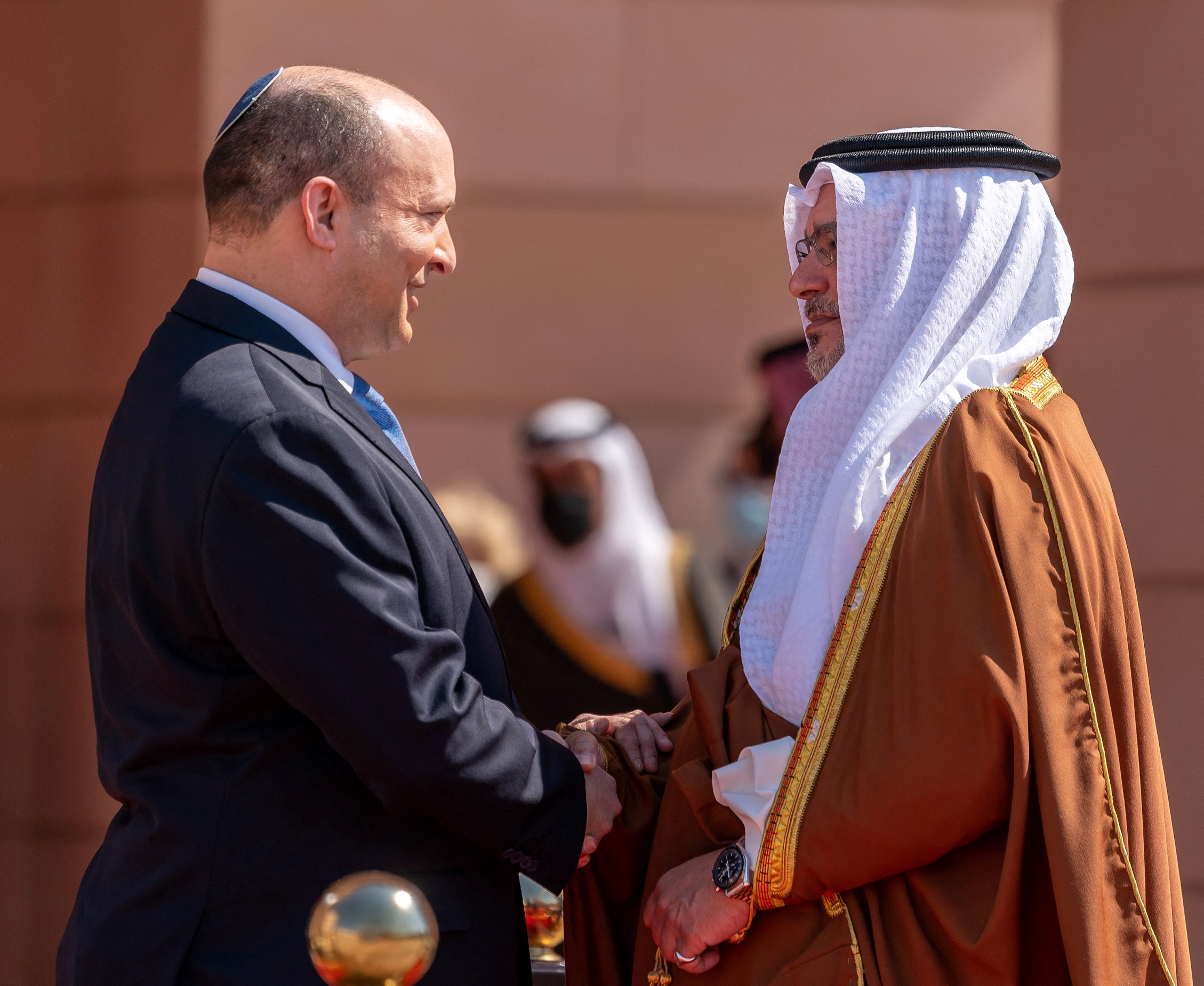Publications
INSS Insight No. 1759, August 31, 2023
The policy of the Israeli government in the Palestinian arena and domestic pressure on the Royal House of Bahrain challenge realization of the potential of the bilateral relations. Bahrain’s benefit from the normalization does not live up to the expectations, at least in the economic aspect. Therefore, if this has not already occurred, contacts are likely to stagnate.
A recent regrettable combination of events illustrated the pressures on relations between Israel and Bahrain and the difficulties of the normalization process between the two countries. In July, a planned trip by Foreign Minister Eli Cohen to Bahrain, intended to be the first visit by a senior Israeli official to the Kingdom since the change of government in Israel, was postponed at the last minute. Bahrain excused its decision on the grounds of technical constraints, but it appears that the reason was the visit by Minister of National Security Itamar Ben Gvir to the Temple Mount a day before the postponement was announced. At the same time, pictures appeared in Bahrain showing Shiite worshippers trampling the Israeli flag to the sounds of cheering during the Ashura ritual – a frequent occurrence demonstrating opposition to normalization of relations with Israel.

The starting point for involving Bahrain in the Abraham Accords was more complex than that of the United Arab Emirates: in Bahrain the Sunni Al Khalifa dynasty rules over a Shiite majority. Unlike the UAE, it has a parliament and vibrant civil society, which frequently challenges the Royal House. Wide public protests against the regime during the so-called Arab Spring in 2011 were met with military intervention by Saudi Arabia and the UAE to protect the rulers in Manama. At the same time, Bahrain’s political room to maneuver is limited due to its dependence on Saudi Arabia, which is also a consequence of its depleted oil reserves. Against this background, Saudi approval of normalization between Bahrain and Israel was seen by Israel as a positive signal from Saudi Arabia.
However, since the signing of the Accords with Israel, there have been limited but consistent protests in Bahrain against Israel and in support of the Palestinians. Israel accepted the argument of the Bahraini Royal House, which claimed that the show of opposition came from the Shia population that is loyal to Iran. For example, when hundreds of Bahrainis demonstrated before the visit of President Isaac Herzog to the Kingdom in December 2022, Israeli elements accused Iran of “inciting emotions.” This argument is not without foundation: the demonstrators against Israel are indeed identified with the Shiite al-Wefak party, whose spiritual leader Isa Qassim was exiled to Iran, from where he broadcasts messages of opposition to normalization with Israel.
Nevertheless, a series of public opinion polls conducted in Bahrain since relations were forged with Israel show that there is no real difference between Sunni and Shiite attitudes to normalization. No less interesting is the sharp decline in support for the Accords over the years: when they were signed in 2020, about 40 percent of Bahrainis held a favorable view, but in subsequent polls this rate fell by 50 percent. The fluctuation shows that opposition to normalization is not inevitable, and is possibly the result of the gap between expectations and reality that arose in the three years that have passed.
Unlike the UAE, Morocco, and Sudan, Bahrain, as far as is known, was not promised any concrete reward by the US administration for joining the Abraham Accords, although it was supposed to derive direct benefit from its new links with Israel: in military terms, through cooperation with Israel on dealing with the Iranian threat, and in economic terms, through the opportunities that the Israeli market would offer the Bahraini economy.
The political-security aspect recorded immediate and impressive progress. Within 18 months of establishing relations, Bahrain was visited by then-Prime Minister Naftali Bennett, Foreign Minister Yair Lapid, Defense Minister Benny Gantz, and Chief of Staff Aviv Kochavi, who all met with senior members of the Royal House and the Bahraini army to discuss security collaboration between the countries. Public visits by Israeli officials to the tiny Kingdom, about 150 kilometers from the Iranian coast, and the sharing of intelligence and drone technology, sent a clear message that Israel and Bahrain were standing together against Iran.

However, the economic aspect of relations lagged behind. Figures from the Central Bureau of Statistics show that while trade between the UAE and Israel in 2021-2022 (excluding diamonds and services) amounted to about $2.5 billion, trade with Bahrain was worth only $20 million. The gap can be partly explained by the fact that the UAE is a global financial hub (and therefore the figures also, and perhaps principally, reflect re-export of goods from other economies), by the opportunities it offers, and its many tourist attractions (in 2022 Dubai received some 15 million tourists). While about a million Israelis visited the UAE in 2022, only a few thousand Israelis visited Bahrain (the difference may be partly explained by the fact that Dubai is a global aviation hub and a stopover for flights to Asia). In 2022, Israel was visited by 1,400 tourists from the UAE, and only 400 from Bahrain.
Economic ties are important to the Bahraini people and more palpable than security contacts with Israel. Forty percent of Bahrainis are ready for some business contacts with Israel that would be beneficial to the local economy, compared to only a tenth who are interested in cooperating with Israel against Iran. The potential economic reward could reach sectors in Bahrain that are outside the ruling classes, for whom normalization not only means violating solidarity with the Palestinians, but also fails to bring the expected financial gain, and persuade them that there are advantages to relations. Speaking to the Israeli media, a source close to the government in Manama hinted that Bahrain would like to see Israeli investment in the Kingdom, and not just Israeli businesspeople coming for short visits to raise money for ventures in Israel.
The moves by the current Israeli government are certainly not good for relations, and the Bahraini Royal house has also condemned statements by right wing ministers and government actions on the Palestinian issue. Unlike the series of visits to Bahrain by senior Israeli political and military officials in the years 2021-2022, when the Bahraini Foreign Minister Abd a-Latif a-Ziani attended the Negev Forum in Israel, so far in 2023 there have been no official high level meetings between the countries. No less striking is the fact that the free trade agreement between Israel and Bahrain, finalized at the professional level a year ago and expected to encourage trade between the countries, has not yet been ratified by the leaders.
The difficulties experienced by the Bahraini government in attempts to progress on normalization are not limited to the diplomatic realm. Last May, a group of 44 prominent religious leaders signed a strongly worded letter to the Bahraini Minister of Education demanding the cancellation of “suspicious changes” to the state curriculum: the removal of Hadiths and details describing the life of the Prophet Mohammed (which apparently concerned his relations with Jews) and a song in praise of Jerusalem and the al-Aqsa Mosque. The letter, which stated that “It is not possible to justify the changes with claims of tolerance and co-existence,” aroused a storm on social networks, and social media discourse indicated further changes found in textbooks: the addition of Israel’s name to the world map, the removal of a lesson in civics that dealt with Jews, and the addition of a lesson dealing with the normalization agreement between Bahrain and Israel. Immediately after publication of the letter, the Crown Prince and Prime Minister were quick to announce the immediate suspension of the changes, and the Ministry of Education reported the appointment of an expert team to review all the changes made to the curriculum. In this way, civil society in Bahrain demonstrated its ability to block certain normalization benchmarks with Israel, which had already been achieved in a similar way in countries such as the UAE and Saudi Arabia without significant public opposition.
Conclusions
The policies of the Israeli government in the Palestinian arena and protests in Bahrain against normalization with Israel are not a threat to relations at this stage, although these relations seem to have stagnated. The opposition to Israel and normalization should also be understood in the framework of the struggle of the Bahraini opposition against the Royal House. Bahraini disappointment with normalization and local incitement against it should not be underestimated. In the long term, this disappointment could also erode the flourishing security and military ties between the countries, and certainly have a negative influence on the decision of other countries that are considering normalizing their relations with Israel and deliberating the likely cost-benefit balance.
Although it is in the interests of the Bahraini government to keep its relations with Israel as separate as possible from the Palestinian issue, weight of this issue for the Bahraini people cannot be ignored. Israel’s actions in this respect and recent events in the West Bank challenge Manama to promote economic collaboration and civilian initiatives that could dispel disappointment with normalization, while the current situation creates a tailwind for protests against it. In spite of its small size and economic weight, the importance of relations with Bahrain lies in its strategic location, its cooperation with the United States (there is a Command HQ of the Fifth Fleet on its territory), and its close ties to Saudi Arabia. Therefore, the importance of the agreement between Israel and Bahrain goes far beyond the benefits of bilateral cooperation – the treaty represents a kind of trial balloon for Saudi Arabia, which is examining the advantages and disadvantages of ties with Israel against the background of the US initiative to promote normalization between Jerusalem and Riyadh.



